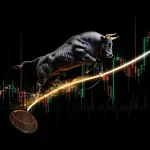
Gold as Currency: Winds of Change in the Global Economy
Oct 18, 2024
The world of finance is a fickle mistress, and the recent fluctuations in the price of gold have left many puzzled. For years, gold has been seen as a haven, a hedge against inflation, and a store of value. But now, a new trend is emerging. The euro and the dollar are trading higher in tandem, and gold is no longer simply a commodity but a currency in its own right.
Some may scoff at the idea of gold as currency, but those who understand the intricacies of the market know that this is not a laughing matter. Traders constantly jump from one currency to another, looking for the best returns. And now, gold is one of those currencies. If this trend continues, we may see a correction in the short term, but the long-term benefits could be significant. Gold may finally be viewed as the ultimate currency.
The Future of Gold
As we look to the future, the potential for a flood of investment in gold is becoming increasingly evident. If the world experiences another currency crisis, as it inevitably will, gold will compete with all the other currencies. The demand for gold could increase exponentially as it is a hedge against inflation and a currency in its own right.
The days of gold as a mere commodity are over. The shifting sands of the market have revealed a new era for gold. No longer simply a hedge against inflation, gold is now a player in the world of finance, competing with all the other currencies out there. If you haven’t considered gold a currency, now is the time to do so. The world is changing, and gold is changing with it.
The Strange Behavior of Gold: A Contrarian View
By closing over $2400 every month, gold has paved the way for a move to the $5000 range, but it will not be a smooth journey. Expect there to be a lot of volatility along the way up. Still, those who understand how to use mass psychology and technical analysis can take some profits off the table and then deploy them when the markets pull back. A simple trick is to wait for gold to trade in the highly overbought zone on the monthly charts and then take profits on 30-50 per cent of your position to redeploy them back on a pullback. The long-term trend is up as China and Russia will continue to deploy large amounts of gold, and other nations will follow their lead.
Recent Gold Purchases by China and Russia
The strategic moves by China and Russia to accumulate gold have been significant and have had a notable impact on the global gold market. Here are some key data points:
2022: Central banks globally bought a record 1,135 tonnes of gold, the highest level in 55 years. China added 62 tonnes of gold in November and December alone, significantly increasing their reserves.
2023: Central banks continued their gold-buying spree, purchasing 1,037 tonnes of gold, just shy of the record set in 2022. This sustained buying trend underscores the growing importance of gold in national reserves.
2024: As of early 2024, China’s gold reserves have risen to 2,245 tonnes, nearly 300 tonnes higher than at the end of October 2022. Russia’s gold reserves have remained steady at approximately 2,332.74 tonnes in the first quarter of 2024.
These purchases are part of a broader strategy by these nations to diversify their reserves away from the U.S. dollar and mitigate geopolitical risks. China and Russia’s consistent accumulation of gold signals their long-term confidence in gold as a stable and valuable asset.
Market Dynamics and Volatility
The journey to $5000 per ounce for gold will be marked by significant volatility. Investors who understand the principles of mass psychology and technical analysis can navigate this volatility effectively. Here are some strategies:
Mass Psychology: Understanding market sentiment is crucial. When gold trades in the highly overbought zone on the monthly charts, it often indicates a peak in short-term investor enthusiasm. This is an opportune moment to take profits on 30-50 per cent of your position.
Technical Analysis: Technical indicators such as the Relative Strength Index (RSI) and moving averages can help identify overbought and oversold conditions. When gold reaches overbought levels, it is prudent to take profits and wait for a pullback to redeploy capital.
Long-Term Outlook
The long-term trend for gold remains bullish. The continuous accumulation of gold by major economies like China and Russia suggests that other nations may follow suit. Several factors drive this trend:
Geopolitical Uncertainty: As geopolitical tensions rise, nations seek to reduce their reliance on the U.S. dollar and diversify their reserves.
Inflation Hedge: Gold remains a trusted hedge against inflation, a growing concern in many economies.
Currency Diversification: By holding gold, nations can diversify their currency reserves and reduce exposure to any currency’s volatility.
Gold: A New Era for Investors
The idea of gold trading as currency is not new, but it has gained more attention recently. If this trend continues, it could have significant implications for investors. Gold may no longer be viewed solely as a hedge against inflation but also as a competing currency. Investors not considering gold as a currency may want to look closer.
If gold does experience a strong pullback, investors should view it as a blessing. It could be the last chance to purchase bullion below $2000. This is an opportunity to add to positions and take advantage of the potential long-term benefits of gold as currency.
Charlie Munger, the vice chairman of Berkshire Hathaway, has often remarked that gold “is a great thing to sew into your garments if you’re a Jewish family in Vienna in 1939.” While Munger remains sceptical of gold as an investment, his acknowledgement of its historical value speaks volumes.
Peter Lynch, the legendary investor of Fidelity Magellan Fund, advises caution but notes, “In the long run, all commodities trend to the cost of production. Gold, however, has a mystical quality that ensures its value.”
John Bogle, the founder of Vanguard Group, often emphasized diversification. “Gold can be part of a diversified portfolio, but it should not be the core,” Bogle once said, stressing the importance of not putting all eggs in one basket.
Geopolitical Moves
Countries like China and Russia have been making headlines for dumping U.S. Treasuries and accumulating gold reserves. As of 2024, China’s gold reserves have surpassed 2,000 metric tons, while Russia’s reserves are nearing 2,300 metric tons. This strategic move is seen as a way to diversify away from the U.S. dollar and mitigate geopolitical risks.
H.L. Mencken once quipped, “An idealist is one who, on noticing that a rose smells better than a cabbage, concludes that it will also make better soup.” In the context of gold, this serves as a reminder that while gold may seem like an ideal investment, it is crucial to understand its complexities and limitations.
Conclusion
Recently, the strange behaviour of gold has left many puzzled, but a contrarian view suggests that this could signify a new era for gold as currency. By closing over $2200 every month, gold has paved the way for a potential move to the $5000 range. However, this journey will not be smooth, and significant volatility is expected. Investors who understand how to use mass psychology and technical analysis can navigate this volatility effectively, taking profits when gold trades in the highly overbought zone and redeploying capital during pullbacks.
The long-term trend for gold remains bullish, driven by strategic moves from major economies like China and Russia. In 2022, central banks globally bought a record 1,135 tonnes of gold, with China adding 62 tonnes in November and December alone. By the end of 2023, central banks had purchased 1,037 tonnes of gold, just below the record from 2022. As of early 2024, China’s gold reserves have risen to 2,245 tonnes, nearly 300 tonnes higher than at the end of October 2022. Russia’s reserves have remained steady at approximately 2,332.74 tonnes in the first quarter of 2024.
These purchases are part of a broader strategy to diversify reserves away from the U.S. dollar and mitigate geopolitical risks. China and Russia’s continuous accumulation of gold signals their long-term confidence in gold as a stable and valuable asset. Other nations will likely follow this trend, further solidifying gold’s role as a competing currency.
Expert insights from figures like Charlie Munger, Peter Lynch, and John Bogle highlight gold’s enduring appeal and strategic importance. Munger acknowledges gold’s historical value, Lynch notes its mystical quality that ensures its value, and Bogle emphasizes the importance of diversification, with gold being a part of a diversified portfolio.
As the world of finance continues to evolve, so does the role of gold. Whether seen as a hedge, a currency, or a store of value, gold’s enduring appeal is undeniable. The shifting sands of gold reveal a new landscape, one where gold as a currency may finally take its rightful place. Investors open to this view may benefit from the long-term bullish implications of gold as a competing currency. While short-term pullbacks may occur, they should be viewed as opportunities to add to positions and take advantage of the potential benefits of gold as a currency.
People who live in glass houses should take out insurance.
Source Unknown
Perspectives Unveiled: Uncommon Insights and Ideas












